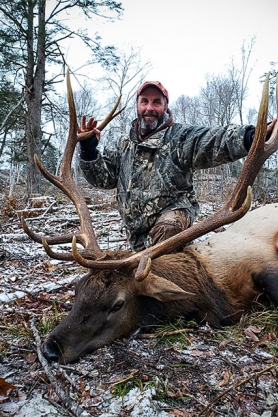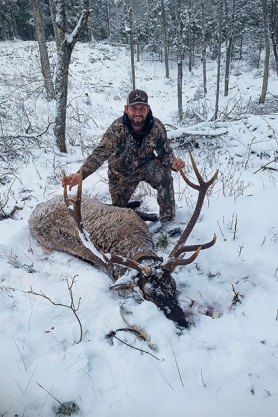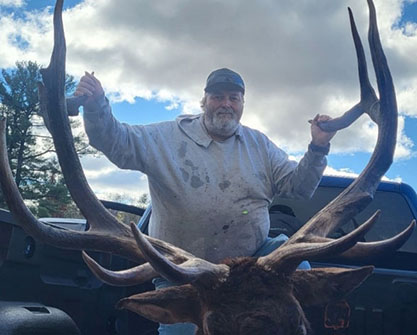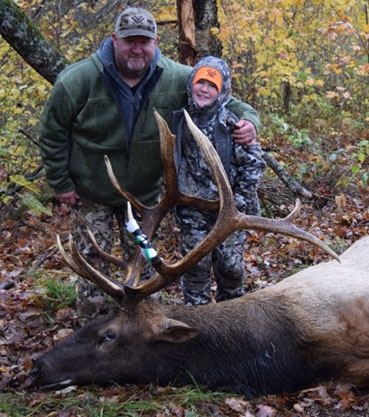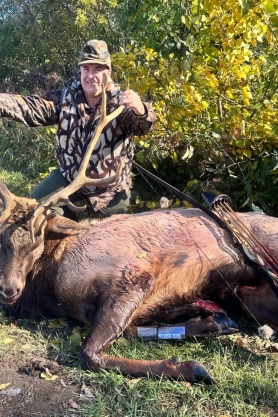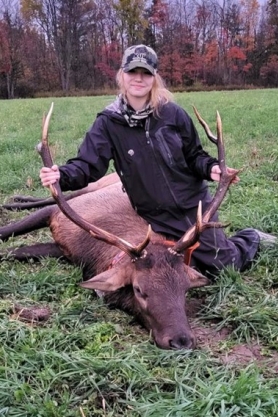Elk Hunting
Season Dates, Regulations and Hours
Once eliminated from the state through overhunting, Wisconsin now boasts a healthy, growing elk population thanks to two restoration efforts, one in 1995 within the Clam Lake Elk Range and one in 2015 within the Black River Elk Range. By 2018, the Clam Lake Elk herd had grown enough in size to sustain a harvest. In October of that year, Wisconsin held its first managed elk hunt. In 2024, the first regulated hunt occurred in the Black River Elk Range. Hunting is a testament to the years of hard work to restore elk to their native range in Wisconsin, continued careful management and the strength of partnerships across agencies and states, tribal governments and non-profit organizations.
2026 Season Dates Archery, Crossbow and Firearm | Oct. 17 - Dec. 13 |
|---|
*Licenses awarded by drawing.
Regulations
Visit the Hunting Regulations webpage for the most current hunting regulations, containing a complete list of rules and regulations.
To facilitate removal from the field, an elk may be divided into multiple parts. All parts of the elk, except the entrails, must be removed from the field and exhibited at the time of registration. Not included in the required removed parts are: hide or lower legs up to the tarsus joint (ankle or hock) on the hind legs and up to the carpus.
Shooting Hours
Hunting hours differ depending on the time of year and location (northern or southern half of the state). Hunters can use the following documents to check hunting hours in the part of the state they hunt.
Purchase A Hunting License
The 2025 Wisconsin Elk Hunt Application Period was open from March 1 through May 31. Applicants were required to select between the Black River Elk Range or the Clam Lake Elk Range when applying. Only Wisconsin residents or active military within Wisconsin can apply.
Successful applicants were drawn and contacted in early June, 2025.
The 2026 application period is anticipated to run from March 1 through May 31. To apply, interested hunters should visit their Go Wild account or a licensed agent to submit their application during the application period. The application fee is $10.
Quotas: Each year, the DNR approves the elk harvest quotas based on recommendations from the Elk Advisory Committee. Since 2024, quotas have been set for both elk ranges. Within the Clam Lake Elk Range, the quote is subject to a 50% declaration by the Ojibwe tribes, per treaty rights within the ceded territory. The other half are issued to Wisconsin resident applicants. The full approved quota within the Black River Elk Range will be randomly drawn from the valid applicant pool. In 2025, the DNR approved an antlerless quota in the Black River Elk Range for the first time.
Note: A person authorized to purchase an elk hunting license issued under a cumulative preference drawing may transfer their awarded elk harvest license to another who meets the required qualifications on the Permit Transfer webpage. Be aware that transferring a permit still counts as a successful drawing for the individual who transferred the successful license draw and the one receiving the elk hunting license. Both hunters will be removed from future drawings for elk in Wisconsin.
Elk Drawing Process
The 2025 Elk Hunting Application Period opened on March 1 and ran through May 31. Future application periods are expected to use similar timing. All hunters who wish to have the opportunity to draw an elk hunting license should apply during an open application period. The application fee is $10.
The drawing occurs in early June each year, and each license winner will be notified by DNR elk staff of their success. It is highly recommended that all personal contact information within the Go Wild system be updated to ensure efficient contact is made with successful applicants after the drawing occurs. Successful applicants must attend a mandatory elk hunter education course before being authorized to purchase an elk hunting license ($49).
Only one application may be submitted per person each year, and no preference points are given. This allows all applicants an equal opportunity to draw an elk hunting license in Wisconsin successfully. If a preference point system were used for elk in Wisconsin, due to the limited number of elk hunting licenses issued and the number of applicants each year, those who did not apply the first year would have virtually no chance of being awarded a hunting license in future drawings.
The application process is only open to Wisconsin residents when 100 or fewer elk hunting licenses are allocated, with exceptions for nonresident Purple Heart recipients and Armed Forces members who exhibit proof of meeting qualifying criteria. When more than 100 elk hunting licenses are issued, Wisconsin residents and nonresidents may apply.
A Wisconsin elk hunt is a once-in-a-lifetime opportunity. As the state statute currently says, an individual cannot receive more than one Wisconsin elk hunting license in their lifetime, which includes bull or antlerless harvest tags.
A portion of each application fee is directly allocated to support elk management. For every $10 application fee, $7 is designated for elk management and research in Wisconsin. These funds are used to enhance elk habitat, monitor each elk herd, support elk research, and conduct outreach to promote elk in Wisconsin. The remaining $3 covers administrative fees, vendor fees, etc.
Ojibwe Tribes And Elk Hunting
The Ojibwe tribes have reserved rights to hunt, fish and gather off-reservation through the signing of treaties with the United States. These federally recognized treaty rights allow tribal members to hunt on public lands within the Ceded Territory of northern Wisconsin and reserve the right to declare up to 50% of the total harvest quota for a variety of wildlife species, including elk on lands of the 1837 and 1842 Ceded Territory. Tribal members who are Wisconsin residents can apply through the state drawing if they so choose. Non-tribal hunters are not allowed to participate in a tribal elk hunt.
The tribes of Wisconsin, along with the 1837 and 1842 treaties, have been strong supporters and partners of elk reintroduction and management efforts. The presence of Elk on the landscape and tribal ability to pursue elk has historically (and continually) been valued for subsistence, cultural, religious, medicinal and economic significance to the Ojibwe Tribes and Ho-Chunk Nation.
The Ojibwe tribal elk hunting season begins the day after Labor Day and runs through the first Sunday after New Year's Day. This is the same harvest season for many of their hunted species. The Great Lakes Fish and Wildlife Commission maintains tribal elk hunting rules and regulations and is available on the Great Lakes Indian Fish and Wildlife Commission website.
Where To Hunt
For the first time since reintroduction, both the Clam Lake and Black River Elk Ranges had quotas in 2024. Each elk range provides ample hunting opportunities, bolstered by substantial blocks of public lands within the ranges. In addition, elk may be pursued on private property if landowner permission is granted.
Additional opportunities within both elk ranges may be open for hunting under the Open Managed Forest Law or Forest Crop Law program. The DNR's Public Access Lands atlas is a valuable tool for locating public land open to hunting.
Clam Lake Elk Range
Public land comprises approximately 68% of the total land area in the Clam Lake Elk Range, including national, state, county and tax-law open forest ownerships. The general terrain is flat, with minor elevation changes throughout. The northern portion of the Chequamegon-Nicolet National Forest, Great Divide District, will include the greatest elevation. Most of the Clam Lake Elk Range forested landscape comprises Northern Hardwood, Aspen or lowland forests. The greater Clam Lake and Flambeau area has ample accommodations, including several hotels, resorts, cabin rentals, and campgrounds, and it is within short proximity to many small towns and cities.
Maps of Clam Lake Elk Range
Clam Lake Elk Range - Boundary Map
Clam Lake Elk Range - Landownership Map
Additional Resources
Chequamegon-Nicolet National Forest: Great Divide District
Black River Elk Range
The Black River Elk Range lies within the central forest region, is comprised of nearly 70% public lands and encompasses large portions of the Black River State Forest and Jackson County lands, offering excellent opportunities to pursue elk. Within the public lands, these areas are predominantly forested, including cover types of oak, pine, mixed central hardwoods, and some aspen forests. The area of private land in the southwest region of the range transitions to private lands with a greater composition of agricultural lands. Throughout the range, changes in topography can be seen, which include flat to rolling; however, some areas offer increased elevation and topography. Although the Wazee Recreational Area is within Jackson County public lands, a section of the recreational area is prohibited from hunting; please follow the link below for additional information.
Black River Elk Range Maps
Black River Falls Elk Range - Boundary Map
Black River Falls Elk Range - Landownership Map
Additional Resources
Hunting Safety Tips
Elk hunters must carry proof of their elk hunting license and elk harvest tag.
- Proof of an elk hunting license may include an original or reprinted paper copy, a Go Wild conservation card, a Go Wild-authenticated Wisconsin driver's license or a digital PDF file issued by the DNR and displayed on an electronic device.
- Only an original or reprinted paper copy is accepted for the elk harvest tag.
Blaze Orange
Blaze orange or fluorescent pink must be worn while elk hunting during an active statewide firearm season. This often occurs during the statewide antlerless hunt in December. Although blaze orange or fluorescent pink is not required outside of an active statewide firearm season, it is highly recommended that at least some highly visible clothing (vest, hat, etc.) be worn. Other types of hunting and recreation are occurring during this period, in addition to elk hunting, so safety should be a high priority.
If a weapon is legal for deer hunting in Wisconsin, it is also legal for elk hunting. As such, elk may be hunted with vertical bows (traditional and compound), crossbows, muzzleloaders, centerfire handguns and centerfire firearms.
Hunter Logistics
All license winners must attend an elk hunter education course before they are eligible to receive an elk hunting license. Hunters will be introduced to various topics related to Wisconsin elk management and research, the history of the Wisconsin elk reintroduction, hunt preparation, rules and regulations, registration process, disease/tissue sampling and more. Hunters will also have the chance to meet DNR staff members and partners to ask elk hunting or related questions.
The location and timeframe will be shared with the successful drawing winners in the given year. The course is free of charge, but it is mandatory. Hunters who did not successfully draw an elk hunting license will not be permitted to attend the elk education hunter course. The successful applicant will be allowed to bring 1 or 2 individuals to the education course who plan on accompanying them on their hunt.
If you intend to hunt alone, you must comply with hunter education requirements as are in place for all hunting activities in Wisconsin, including passing an official hunter safety class. The elk hunter education course does not qualify for the hunter education requirement.
Mentored hunting is allowed. A hunter who has not obtained hunter education requirements may still participate with a qualified mentor. The mentor must hold a valid Wisconsin hunting license of any type. The mentor may carry a weapon if hunting other game, such as deer, during an open deer hunting season or if the mentor possesses a concealed carry permit. The mentor is not authorized to kill an elk for a mentee unless dispatching a wounded elk for the mentee is age 17 or younger. Visit the mentored hunting page for more information.
Additional people may accompany a licensed elk hunter on the hunt. However, group hunting is prohibited. Only the person who issued the elk hunting license may shoot an elk. Having extra people along may be particularly helpful in recovering an elk from the field. There is no limit to the number of people who may accompany or assist the hunter. If hunting on enrolled acres through the Wisconsin Damage Abatement and Claims Program (WDACP), all members of the party must individually be granted permission to access the land.
Elk may be divided into as many pieces as needed to be removed from the field. All parts must be removed from the field except the lower legs and internal organs, including the skeletal structure of the elk.
Guides may be used to hunt elk in Wisconsin. Guides must have a valid Wisconsin DNR Guiding License, which is not species specific. The Wisconsin DNR will not provide private guide information to elk hunters. No person may engage or be employed for any compensation or reward to guide, direct or assist any other person in hunting, fishing or trapping unless the person is issued a guide license by the department, subject to ss. 29.024 and 54.25 (2) (c) 1. d. No guide license for hunting or trapping may be issued to or obtained by any person who is not a resident of this state. No guide license may be issued to any person under the age of 18 years. The holder of a guide license shall comply with all of the requirements of Chapter NR 29. Additionally, any person employed as an elk hunting guide on the United States Forest Service - National Forest must complete appropriate permitting for guiding on federal lands through the USFS.
Register A Harvest
Upon elk harvesting, the elk harvest tag must be immediately validated by removing the bottom portion (validation stub). Hunters are encouraged to protect the paper harvest tag. The harvest tag must be attached to the elk if the hunter leaves the animal temporarily. If you leave it, tag it.
All harvested elk must be registered and are required to be presented in person by 5 p.m. the day after recovery. To do so, they must contact a local wildlife biologist to register the elk in the field or at a mutually agreed-upon meeting place. Instructions and details will be provided to the hunters at the elk hunter education course. The elk may not leave the county of harvest or the adjacent county of harvest unless the registration process has been initiated with a wildlife biologist.
Online registration of a harvest through GameReg is not available for elk registration. After in-person registration is completed, department staff will enter the hunter's elk registration in GameReg. The harvest record will appear on the hunter's Go Wild account. The elk registration confirmation number will then be available to the hunter.
Hunters will be provided tissue sampling kits at orientation for herd health sampling. Hunters will be asked to provide CWD tissue samples at registration, including lymph nodes and obex, at registration. Additional tissue samples may include lung, liver, skin, and a tooth.
Elk Health & Diseases
The unique nature of a small, reintroduced elk population in Wisconsin has provided the opportunity to test a high percentage of the individuals for exposure to diseases of significance to elk, humans and domestic animals. Since the initial reintroduction of the northern elk population in 1995, intensive monitoring using radio collars has allowed for a sound background on the exposure of elk to diseases of concern and prompt mortality investigations to determine the cause of death.
Through regular capture and handling of elk in Wisconsin, blood and fecal samples have been collected to evaluate exposure to organisms responsible for Brucellosis, Johne's Disease, Bluetongue, Epizootic Hemorrhagic Disease (EHD), Leptospirosis, Eastern Equine Encephalitis, Western Equine Encephalitis, Venezuelan Equine Encephalitis, West Nile Virus (WNV), Anaplasmosis, Neosporosis, Bovine Herpes, Infectious Bovine Rhinotracheitis (IBR) and Bovine Viral Diarrhea (BVD). These surveillance efforts have revealed either limited exposure by Wisconsin elk (WNV and EEE) or no identified exposure (all others). These tests represented both surveillance efforts for diseases that elk have been identified as compatible hosts for, and sources of, an infection that is not present in Wisconsin (Brucella species) and investigatory in evaluating possible diseases that could impact elk populations.
Based on the diseases and parasites that have been identified within Wisconsin and a desire to prevent the introduction of diseases not present within the state, a testing plan was developed in collaboration with other state and federal agencies for the 2015-2019 elk translocation from Kentucky. The plan included testing for diseases that primarily affect wildlife and those that primarily affect domestic animals but can spill over into wildlife and included testing for Bovine Tuberculosis (TB), Bovine Brucellosis (Brucella abortus), Bovine Viral Diarrhea Virus, Bluetongue and Epizootic Hemorrhagic Disease. The protocol outlined in that plan was executed fully, and no elk were identified as infected with these diseases.
Chronic Wasting Disease in Elk
Chronic wasting disease (CWD) is a fatal, infectious nervous system disease of deer, moose, elk and reindeer/caribou. It belongs to the family of diseases known as transmissible spongiform encephalopathies (TSEs) or prion diseases.
The DNR began monitoring the state's wild white-tailed deer population for CWD in 1999. The first positive detections were found in 2002 in Dane County, approximately 250 miles from the Northern Elk Management Zone and approximately 120 miles from the Central Elk Management Zone. Before the most recent reintroduction, extensive testing was conducted within both elk management zones to monitor for CWD. During translocation, additional measures were also taken to ensure that equipment and staff were not transmitting the prion that causes CWD to translocate elk. As of February 2024, 227 elk have been tested, and no wild elk have tested positive for CWD in Wisconsin.
Other Considerations for Elk Health
Baiting and Feeding: Currently, baiting and feeding for elk are prohibited by the Administrative Code. Wisconsin's current prohibition on baiting and feeding for elk is a strong management tool with multiple benefits. In Wisconsin, recreational feeding of elk has been responsible for numerous vehicle collisions as elk crossed roadways to reach backyard feeding operations, and prohibitive rule changes helped drastically reduce roadway mortality. Additionally, baiting/feeding has caused several elk mortalities via metabolic toxicity associated with grain overload (the introduction of readily digestible carbohydrates, such as corn, that their rumen cannot process appropriately).
Rehabilitation: Elk's behavior and nature of elk make them an unlikely candidate for inclusion in wildlife rehabilitation efforts, and it is recommended that they be excluded from these endeavors.
Previous Elk Hunts
Elk Hunt 2024
Black River Elk Range: The 2024 inaugural hunt within the Black River Elk Range had a quota of four bulls. Of the four state-licensed elk hunters, all four hunters harvested a bull on the third day of the season. Three hunters found success on private lands and one hunter chose to pursue elk on public lands. Each bull harvested was with a center-fire rifle. All hunters were very excited about their bull harvest, two of which submitted their harvest to be scored for consideration in the state record books.
Clam Lake Elk Range: The 2024 Elk hunting season included a four-bull declaration by Ojibwa tribal hunters and a four-bull quota for state-licensed elk hunters in the Clam Lake Elk Range. 2024 marked the 7th elk hunting season in Wisconsin’s northern elk range. Tribal elk hunters harvested four bull elk and state-licensed hunters harvested two of their four bull quota. All 6 elk were harvested on public lands. Five bulls were harvested on United States Forest Service lands near Clam Lake, WI and one was harvested on the Flambeau River State Forest(FRSF). The FRSF bull was harvested by a 10-year-old mentored hunter, a first for the Wisconsin’s Mentored Hunting Program. The bull was the same age as the hunter. All elk were harvested using center-fire rifles.
Elk Hunt 2023
The 2023 Elk Hunting Season had an approved quota of eight bull elk, which was only for the Clam Lake Elk Range. Tribal hunters and state hunters each harvested four bull elk to meet the approved quota. Some highlights include the first modern-day traditional archery harvest and the first youth hunter harvest, both pictured below.
Elk Hunt 2022
The 2022 elk hunting season was completed with the successful harvest of eight bull elk. Each state-licensed hunter and member of the Ojibwe tribes harvested four elk. One state-licensed hunter finished the first modern-day vertical bow-harvested elk in Wisconsin. 2022 also marked this final year (2018-2022) in which the Rocky Mountain Elk Foundation held a drawing to issue one tag from the State of Wisconsin portion of the elk harvest quota.
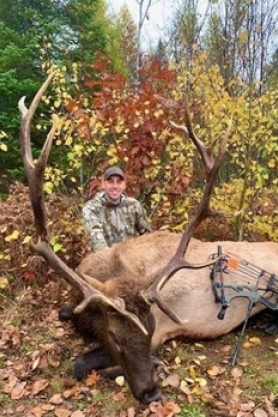
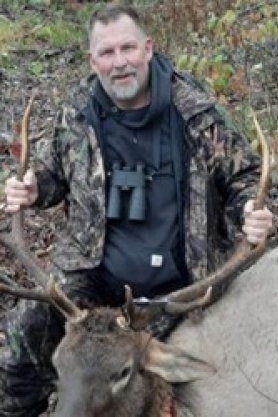
Elk Hunt 2021
In the fall of 2021, Wisconsin hunters pursued four bull elk while Ojibwe hunters harvested four bull elk under the guides of an evenly split 8-bull elk quota. Three DNR-licensed hunters completed their harvest.
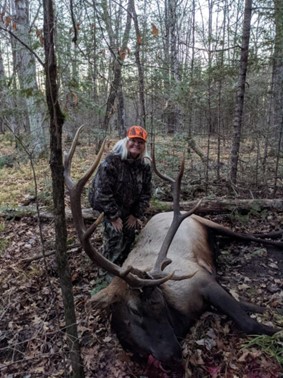
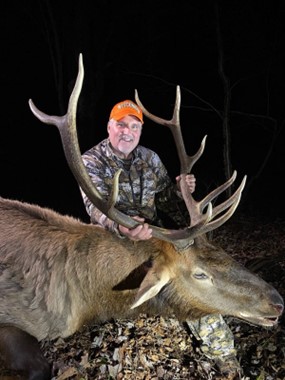
Elk Hunt 2020
The 2020 elk hunting ended with all five state hunters harvesting an elk in the Clam Lake Range.
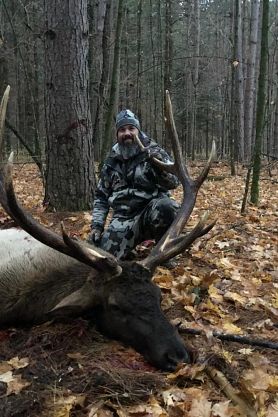
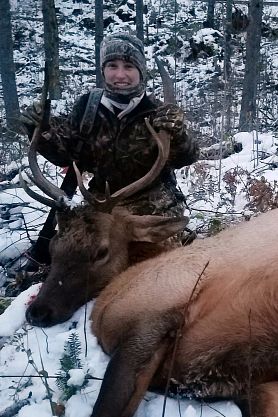
Elk Hunt 2019
The 2019 elk season concluded with the harvest of the tenth bull on Nov. 10, 2019. The 10-bull quota for 2019 was met, with five bulls being harvested by state hunters and five bulls by the members of the Ojibwe Tribes. The 2019 Wisconsin elk hunt occurred only within the Clam Lake elk range in Ashland, Bayfield, Price and Sawyer counties.
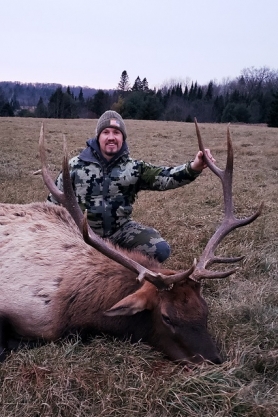
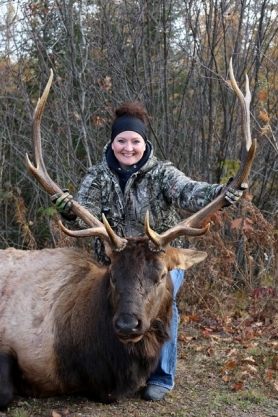
Elk Hunt 2018
Wisconsin's first managed elk hunt in state history drew intense interest, with over 38,400 applicants in the state drawing and an additional 5,000 raffle tickets sold by the Rocky Mountain Elk Foundation. Nine bulls were harvested out of the 10-bull quota, including four bulls by state hunters during the 39-day hunt and five bulls by members of the Ojibwe Tribes.
